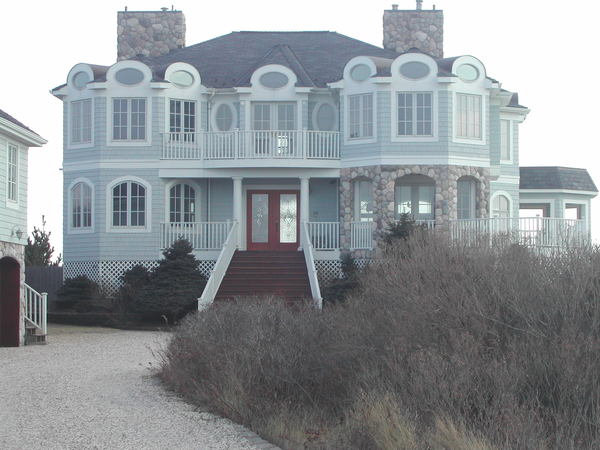
The old adage “Never mix business with pleasure” seems particularly relevant amid the ongoing debate centered on the recent New York State Division of Tax Appeals decision, which states that if a homeowner has a primary residence in another state, but owns a permanent place of residency in New York and spends more than 183 days in New York, that homeowner is subject to paying state income tax.
The new decision does not affect those who own second homes but whose primary residences are already in New York State.
Though owning a second home has its share of ups and downs, financial and otherwise—even before the recent ruling was put into effect, some out-of-state-based second-home owners were still required to pay New York State income tax but at the non-resident rate—the newest legislation could have a negative ripple effect here on the East End.
According to New York State Assemblyman Fred W. Thiele Jr., more than 50 percent of the 62,000-plus homes on the South Fork are second homes. He added that, according to the U.S. Census, 58 percent of the approximately 40,000 homes east of the canal are second homes, and approximately 35 percent of the 22,000 homes west of the canal are second homes.
Though a philosophical debate over the legislation rages—is the mandate as fair as possible? What really constitutes permanent residency? Can someone be considered a permanent resident in two places?—the more pressing question is whether or not the current legislation will bring the revenue stream generated by second-home owners on the East End to a grinding halt.
During a telephone interview last Wednesday, Bridgehampton-based Saunders & Associates real estate broker Diane Saatchi gave her take on the mandate that is now on the books.
“While the premise is a reasonable way to tax the wealthy who use [our state’s] resources, it also may have a negative unintended consequence,” Ms. Saatchi said. “Connecticut and New Jersey residents ... who have or plan to purchase vacation homes in New York resort locations, would realize considerable additional income taxes and would thus be more likely to select other states for second or vacation homes.”
To illustrate the new legislation, on Tuesday, February 22, Mr. Thiele sent along an example about a court case brought by those whom he referred to as the “Barker” family. The family lived in Connecticut but had a vacation home on the South Fork. Their vacation home was used about five or six weekends per year, and though Mr. Barker worked in Manhattan, each night he would return to his home in Connecticut.
The Barkers paid New York State income tax, but at a non-resident rate. However, when the case was brought before a New York court, it was determined that the Barkers were responsible to pay the state’s income tax because between work and vacation Mr. Barker was in the state more than 183 days, and because he had what the court considered a “permanent” home in the state. Whether or not the home was a vacation property was of no matter.
New York State Tax Code states that a permanent place of abode is one that excludes “a camp or cottage which is suitable and used only for vacations.” And that is where conflicts arise: what of the large compounds on the East End that serve as a vacation home but could, conceptually, be lived in year-round without issue?
Attorney Jonathan Tarbet of Tarbet, Lester & Schoen, PLLC in Amagansett also weighed in on the matter.
“Well, it does not seem fair that New York can tax income earned in a different state just because someone owns a house here and works here. That income is already being taxed by the actual home state,” Mr. Tarbet said during a telephone interview last week. “I believe the 183 day rule needs to be defined as actually spending 183 nights in the state.”
Mr. Tarbet added, “As it stands now, the state believes if you work here during the day, that is enough. Where is the line? Eight hours? Would six hours be enough? What if you simply spent 10 minutes a day crossing through New York to get to your job in New Jersey from your home state? I don’t think anyone could complain if you slept here for 183 days and that is the rule everyone was operating by prior to this decision.”
At present, Mr. Thiele said he is trying to strike a balance between the old and new laws and is currently introducing legislation in the New York State Assembly that would add an additional requirement for income-tax residency. In a prepared statement released last Tuesday, he stated, “In addition to being in New York State for 183 days for business or personal reasons and owning a permanent residence, a person would also have to spend at least 120 days at the vacation home to be a resident for income tax purposes. Thus, residents could spend summers and weekends at their second home without inadvertently becoming a New York State tax resident.”
But there are those who think that the taxation is fair, particularly as it relates to those who are receiving income from their second homes or avoiding paying taxes through legal loopholes.
Southampton homeowner Sam Oneo—he said that he does not have a second home on the East End but is a longtime resident of Southampton and has been gainfully employed (and paying taxes) for quite some time—said he sees this complicated issue rather simply.
“If you have a second home on the East End, you should certainly be required to pay state income tax,” he said last Thursday. “After all, how many of these second-home owners sublet or rent their properties for the summertime? Our resources are being used up and [second-home owners] stand to make money, so you have to pay your taxes on that. You’re using your property year-round then. And if I’m paying taxes year-round, you should too.”